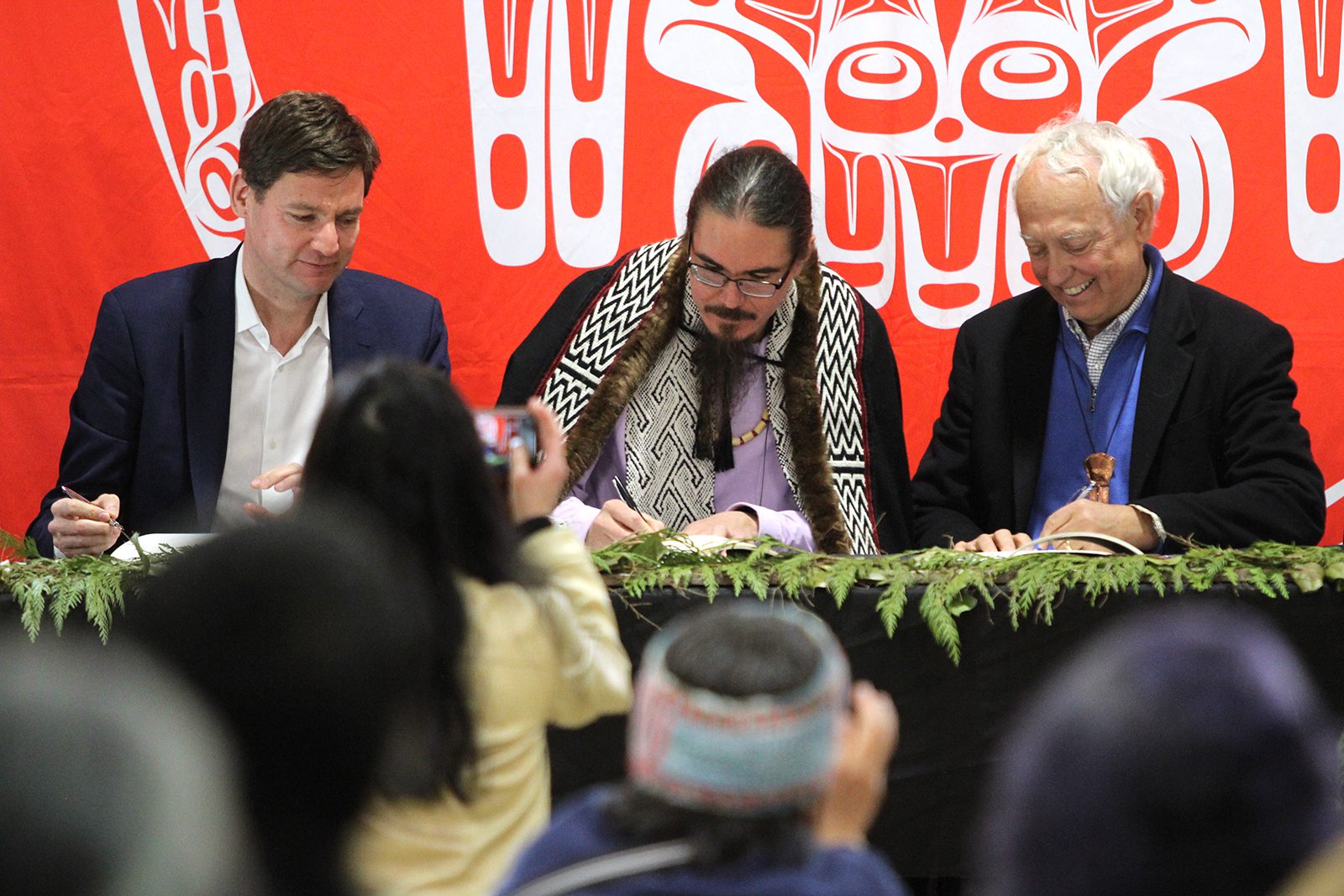
After supportive votes by the Haida people and by the B.C. legislature, and without a treaty or a court ruling, the B.C. government has formally recognized that the Haida Nation holds Aboriginal title to all of Haida Gwaii.
The agreement that made it happen is called the Gaayhllxid • Gíihlagalgang (“Rising Tide”) or Haida Title Lands Agreement. For a step that took more than 20 years to take, it’s remarkably short — just eight pages long.
Speaking at an April 14 signing ceremony in Skidegate, Jason Alsop, Gaagwiis, said the Haida Title Lands Agreement honours the truth of the Haida Nation’s ancient and ongoing relationship with Haida Gwaii and a much shorter history with British Columbia that has often been dark.
“It’s an acknowledgment of past denials and harms and fully embracing the truth that we all know — that Haida Gwaii is Haida land, always has been, and always will be,” he said.
Premier David Eby noted that he set foot on Haida Gwaii for the first time an hour before the signing, that the B.C. government arrived some 150 years before, and that the Haida people have lived here since time immemorial.
“So I do this with a sense of my very limited role here,” he said.
Eby said he appreciated the signing not only as premier but also as a lawyer.
Before he was elected, Eby worked as a human rights lawyer, with leading roles in the BC Civil Liberties Association and the Pivot Legal Society in Vancouver’s Downtown Eastside.
“I appreciate this day as a lawyer, too, because what we’ve done here together is something that the courts have been telling governments in Canada to do for many generations now,” he said, referring to a series of court rulings since 1973 that have found Aboriginal title exists in B.C., and that it is better for the B.C. and federal governments to recognize it by making agreements with First Nations directly rather than leaving for courts to decide.
“It is an entirely different way of recognizing title.”
In April, over 500 Haida Nation members voted over 95 per cent in favour of the Rising Tide agreement.
On May 16, it received royal assent in the B.C. legislature after a vote split on party lines. The enacting legislation received 53 votes in favour from NDP, Green Party, and independent MLAs, and 25 votes against from members of B.C. United and B.C. Conservatives.a
Unlike a treaty, the Rising Tide agreement is not a comprehensive set of laws but contains key principles for more detailed negotiations and legal changes set to take place over roughly the next two years, including the transfer of all former Crown lands on Haida Gwaii to the Haida Nation.
Besides recognizing Haida Aboriginal title, the agreement affirms that neither private land owners, municipalities, the regional district, nor the delivery of public services on Haida Gwaii will be affected.
At a town hall held in Masset earlier this spring, questions from the floor by both Haida and non-Haida people hinted at some of what remains to be worked out.
People asked whether they would pay income taxes off-reserve, the future of forestry tenures, and how fishing and hunting regulations might change. Others asked how non-Haida people will be represented in decisions affecting them, and about what restitution the province will pay for past logging practices.
A lawsuit launched by the Haida Nation against the B.C. and federal governments for damages remains in effect, with a trial date expected in 2026. In that case, whatever issues cannot be resolved by negotiations will be decided.
At the signing ceremony, B.C. Minister of Indigenous Relations and Reconciliation Murray Rankin echoed the idea that his government believes it’s better to resolve such issues out of court.
“We could have been facing each other in a courtroom — we could have been fighting for years and years,” he said.
“But we chose a different path.”